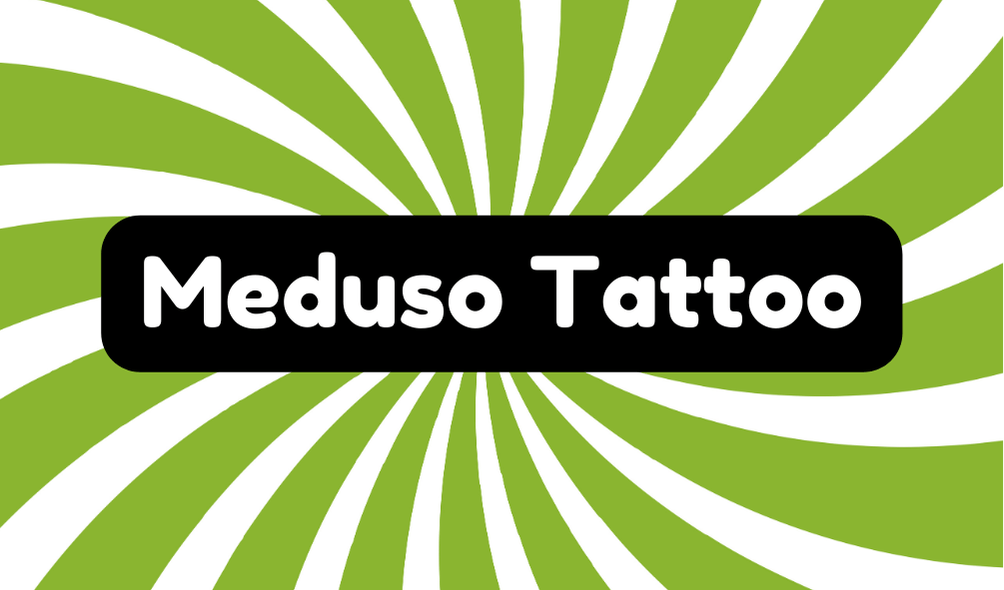A Medusa tattoo carries deep meaning and historical significance. Originally a beautiful maiden, Medusa was transformed into a monster by Athena, symbolizing betrayal and resilience. Today, it represents empowerment, survival, and protection against negativity. Many people see it as a reminder that vulnerability can lead to strength. While some wear it for artistic appeal, it is crucial to recognize the complex narratives behind this symbol. From ancient myths, Medusa evokes themes of feminine strength and personal transformation, making it relevant in discussions about social issues. Explore further to uncover more about its evolving significance and cultural impact.
Synonyms
When exploring the meaning of a Medusa tattoo, you'll find several synonyms that capture its essence. The symbolic significance of Medusa extends beyond mere aesthetics; she represents varied cultural interpretations. From protection to empowerment, here are three poignant synonyms that resonate:
- Guardian – Medusa's imagery often serves as a protective talisman against negativity.
- Survivor – Many view her as a symbol of survival, particularly in the context of overcoming adversity.
- Empowerment – She's frequently associated with female strength, embodying resilience and the reclamation of narratives.
Recognizing these synonyms allows you to grasp the Medusa tattoo's depth and meaning. It's essential to critically analyze these interpretations in today's world, where trends can often dilute true significance.
Example of Sentences
Understanding the significance of a Medusa tattoo can be enhanced by observing how it fits into everyday language. Medusa symbolism resonates powerfully, often leading individuals to seek a deeper connection with her narrative. Here are a few ways you might express this:
- "Her Medusa tattoo reflects her strength, celebrating survival against all odds."
- "When she wears her Medusa tattoos, it's a bold statement of defiance against negativity."
- "His Medusa tattoo serves as a reminder that vulnerability can transform into empowerment."
These examples highlight how Medusa tattoos aren't just body art; they embody stories of resilience and empowerment. As you explore Medusa's complex symbolism, consider the impact these tattoos may have on both personal identities and broader discussions about strength and protection.
Origin
Throughout history, Medusa's origin in Greek mythology fascinates many. Medusa mythology reveals that she started as a stunning maiden cursed by Athena, transforming her into a monster with snakes for hair. This punishment arose after Poseidon violated her in Athena's temple, underlining themes of betrayal and injustice. Reflecting on this tale, you can see its cultural significance; Medusa became a symbol of resilience amidst adversity. Her terrifying image evolved into an apotropaic symbol designed to ward off evil, merging her tragic story with a protective role. Yet, you might question why such a powerful figure had to endure such a fate, raising deeper reflections on how society often punishes victims instead of their aggressors in narratives past and present.
Collocations
Exploring the collocations associated with Medusa tattoos reveals a rich tapestry of meanings and emotions intertwined with her powerful image. You'll find that these tattoos often reflect deep personal narratives. Here are three impactful collocations that capture the essence of Medusa symbolism and representation:
- Empowerment through adversity
- Protective artistry
- Feminine resilience
Each phrase highlights how Medusa serves as a beacon of strength and transformation. While her image can be empowering, it's crucial to understand the context behind it. Medusa's narrative goes beyond mere aesthetics; it embodies survival and the reclamation of one's power. By recognizing these collocations, you can appreciate the multifaceted meanings behind Medusa tattoos and their emotional depth in modern culture.
How to Use in Everyday Language
Medusa tattoos resonate deeply with many, making them a conversation starter or a statement of personal identity. When discussing Medusa symbolism in everyday language, you might highlight her role as a protective figure. Use phrases like "this tattoo protects me" to convey its significance in your life.
Here's a quick guide:
| Context | Example Phrase |
|---|---|
| Empowerment | "I embrace my Medusa tattoo!" |
| Protection | "It's my shield against negativity." |
| Identity | "This represents my journey and strength!" |
Why Is It Still Relevant Today?
Today, Medusa tattoos frequently symbolize empowerment and resilience, resonating with individuals who want to reclaim their narratives. This relevance stems from their deep cultural significance, emerging from ancient myths that depict Medusa as both a victim and a powerful figure. In contemporary interpretations, you see Medusa tattoos not just as art, but also as statements against oppression and injustice. They connect personal survival stories to broader discussions about female strength. However, while many embrace this symbolism, it's important to evaluate whether the trend genuinely reflects empowerment or simply capitalizes on artistic novelty. As society evolves, the narrative around Medusa remains significant; it invites you to explore the duality of strength, vulnerability, and transformation inherent in her story.







